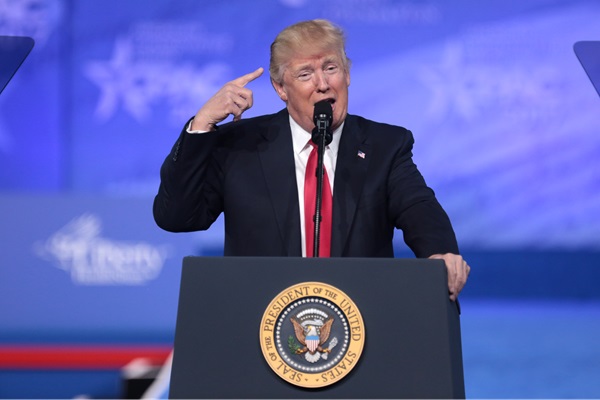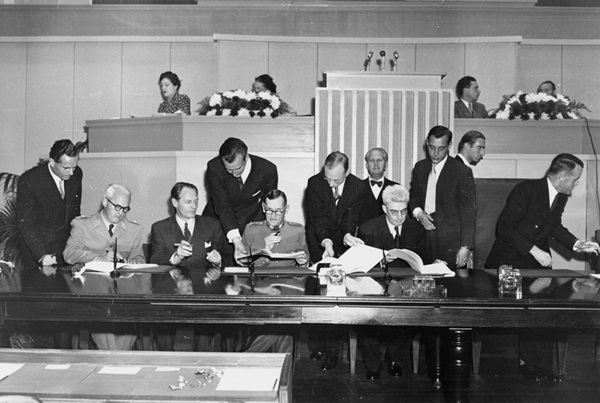.png)
UK Firms Get Foothold In Govt Contracts; Are Indian MSMEs On Equal Footing In UK?
Allowing UK firms to compete on near-equal terms under FTA could crowd out Indian MSMEs, which depend heavily on protected access to government contracts.


By Ajay Srivastava
Ajay Srivastava, founder of Global Trade Research Initiative, is an ex-Indian Trade Service officer with expertise in WTO and FTA negotiations.
May 8, 2025 at 3:21 PM IST
India first liberalised its government procurement market, one of the largest in the world at nearly $600 billion annually or about 15% of its GDP, when it signed a free trade agreement with the UAE. It did not raise much alarm then, as some protections were built into it.
The latest FTA with the UK, touted by the government as the gold standard for all such future agreements, is lax on such protections.
UK companies can now compete for about 40,000 tenders each year in sectors such as construction, healthcare, energy, and transportation. These firms will also gain free access to India’s e-procurement portal, making participation easier and more informed.
What’s more concerning is that such firms with just 20% UK content in their goods or services will now be classified as ‘Class 2 Local Suppliers’ under India’s Make in India procurement rules, a status previously reserved only for Indian firms. This grants them the same eligibility to compete in tenders that are preferentially designed to promote Indian producers.
Allowing UK firms to compete on near-equal terms could crowd out Indian MSMEs, which depend heavily on protected access to government contracts. It also dilutes one of India’s last remaining industrial policy tools, government procurement preferences, used to promote domestic manufacturing, innovation, and jobs.
While UK firms benefit from deep and preferential access, Indian firms face a much more restricted and competitive environment in the UK’s procurement market. Evidence shows that less than 0.5% of EU procurement goes to non-EU suppliers, and even in the UK, only £20 billion or less is awarded to foreign bidders. Indian firms, already lacking scale and familiarity with UK procurement rules, are unlikely to gain meaningful access to these markets.
This imbalance is not just economic, it is strategic.
Allowing foreign firms to compete on equal footing within India weakens the policy tools India needs to build local capacity in vital areas like defense, renewables, health systems, and infrastructure. It also threatens the ecosystem of MSMEs that rely on protected access to government contracts to stay viable.
Policy Imperatives
• India must approach the implementation of the GP chapter in the India–UK FTA with extreme caution
• Exclude strategic sectors like defense, railways, and core infrastructure from foreign access.
• Retain the right to set and revise local content criteria, especially to prioritise domestic suppliers for national interest objectives.
• Ensure robust monitoring of actual UK participation in Indian tenders and demand reciprocity in market access based on real outcomes.
• Avoid extending state-level procurement or MSME-specific schemes to foreign suppliers.
• Create a review mechanism to assess the impact of foreign participation and recalibrate commitments if they harm domestic industry.
India has so far opted out of the WTO’s Government Procurement Agreement, preserving its right to favour domestic firms. Under current policy, 25% of government contracts are reserved for MSMEs, with sub-quotas for SC/ST- and women-owned enterprises.
In defence procurement, 25% of components must be sourced from Indian MSMEs. These provisions reflect a deliberate effort to promote industrial indigenization, support job creation, and empower small enterprises that often depend on public contracts for survival and growth.
India’s government procurement policy has served as a pillar of industrial and MSME development. Replacing its strategic flexibility with binding legal commitments under FTAs risks undercutting the very sectors that FTAs are meant to strengthen. The government procurement provisions in the India–UK FTA must be seen as a test case. If not implemented prudently, this agreement could become a template for future losses in policy autonomy.







